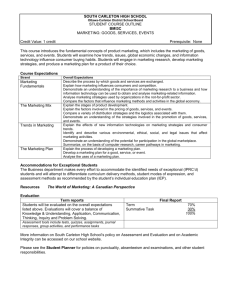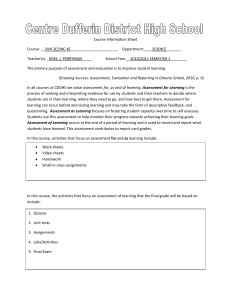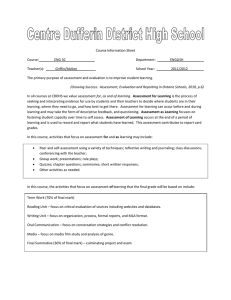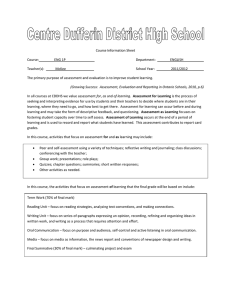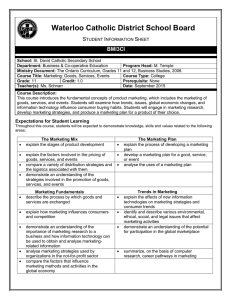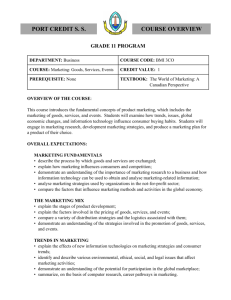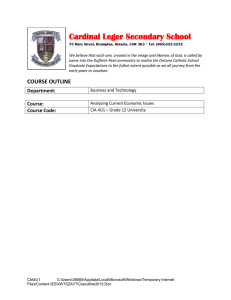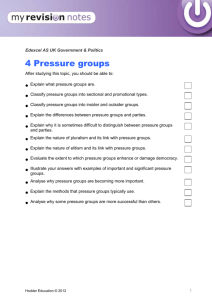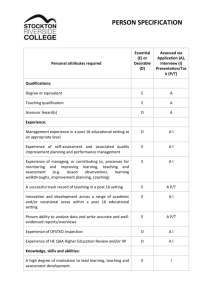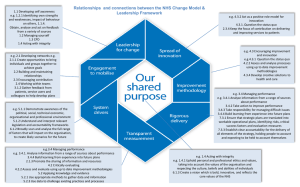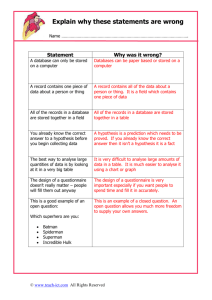Course Code - St. Augustine Catholic High School
advertisement
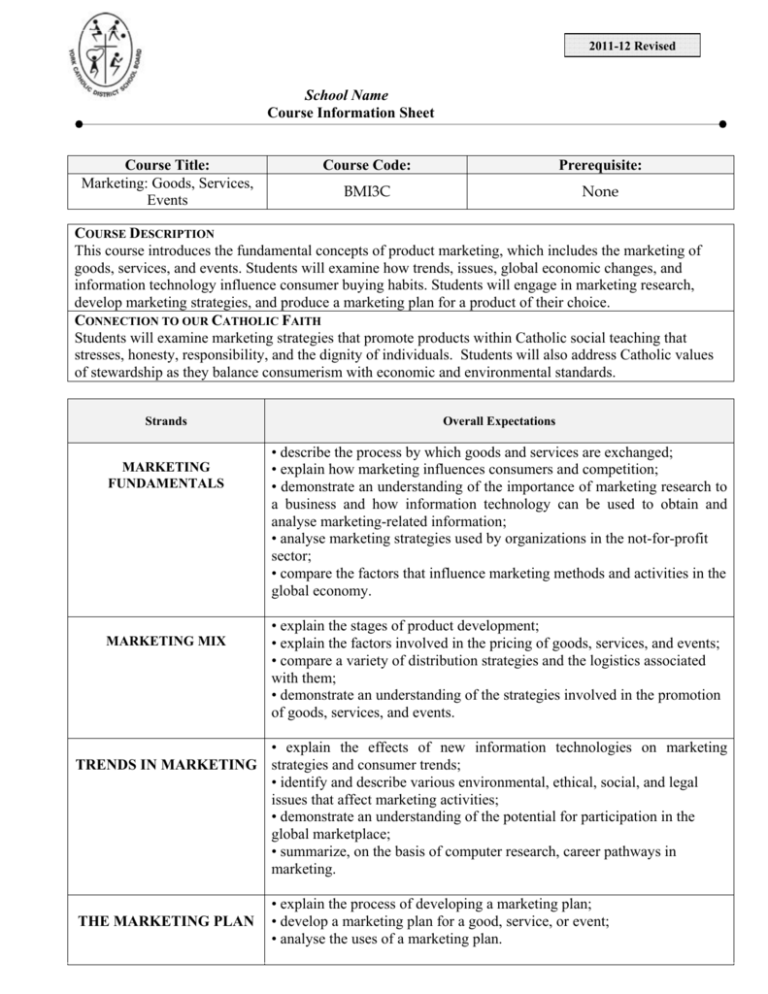
2011-12 Revised School Name Course Information Sheet Course Title: Marketing: Goods, Services, Events Course Code: Prerequisite: BMI3C None COURSE DESCRIPTION This course introduces the fundamental concepts of product marketing, which includes the marketing of goods, services, and events. Students will examine how trends, issues, global economic changes, and information technology influence consumer buying habits. Students will engage in marketing research, develop marketing strategies, and produce a marketing plan for a product of their choice. CONNECTION TO OUR CATHOLIC FAITH Students will examine marketing strategies that promote products within Catholic social teaching that stresses, honesty, responsibility, and the dignity of individuals. Students will also address Catholic values of stewardship as they balance consumerism with economic and environmental standards. Strands MARKETING FUNDAMENTALS MARKETING MIX Overall Expectations • describe the process by which goods and services are exchanged; • explain how marketing influences consumers and competition; • demonstrate an understanding of the importance of marketing research to a business and how information technology can be used to obtain and analyse marketing-related information; • analyse marketing strategies used by organizations in the not-for-profit sector; • compare the factors that influence marketing methods and activities in the global economy. • explain the stages of product development; • explain the factors involved in the pricing of goods, services, and events; • compare a variety of distribution strategies and the logistics associated with them; • demonstrate an understanding of the strategies involved in the promotion of goods, services, and events. • explain the effects of new information technologies on marketing TRENDS IN MARKETING strategies and consumer trends; • identify and describe various environmental, ethical, social, and legal issues that affect marketing activities; • demonstrate an understanding of the potential for participation in the global marketplace; • summarize, on the basis of computer research, career pathways in marketing. THE MARKETING PLAN • explain the process of developing a marketing plan; • develop a marketing plan for a good, service, or event; • analyse the uses of a marketing plan. Units and Timelines Unit Title Approximate Time Instructional strategies: modeled, shared and guided instruction, cooperative group learning, accountable talk, independent application and consolidation, experiential learning, inquiry-based learning, robust thinking (critical analysis and reflection). Assessment and Evaluation Breakdown CATEGORIES 100% Knowledge/Understanding Thinking Communication Application 25% 25% 25% 25% TERM 70% FINAL 30% . CPT 20% . EXAM 10% Assessment and Evaluation Strategies: classroom presentations, conferences, essays, response journals, demonstrations, interviews, learning logs, quizzes, tests, and exams, observations, performance tasks, portfolios, question and answers, self-assessment. Assessment and Evaluation Tools: Checklists, exemplars, rating scales, rubrics, metacognition, self and peer assessment, anecdotal notes. Focus on Learning Skills Responsibility Organization Independent Work Collaboration Initiative Self-Regulation Fulfils responsibilities and commitments within the learning environment. Completes and submits class work, homework, and assignments according to agreedupon timelines. Takes responsibility for and manages own behaviour. Devises and follows a plan and process for completing work and tasks. Establishes priorities and manages time to complete tasks and achieve goals. Identifies, gathers, evaluates, and uses information, technology, and resources to complete tasks. Independently monitors, assesses, and revises plans to complete tasks and meet goals. Uses class time appropriately to complete tasks. Follows instructions with minimal supervision. Looks for and Accepts various roles and acts on new ideas an equitable share of work in and opportunities a group for learning. Responds positively to Demonstrates the the ideas, opinions, values, capacity for and traditions of innovation and a others. willingness to take Builds healthy peer-torisks. peer relationships through Demonstrates personal and curiosity and media-assisted interactions. interest in learning. Works with others to Approaches new resolve conflicts and build tasks with a positive consensus to achieve group attitude. goals. Recognizes and Shares information, advocates resources, and expertise, and appropriately for promotes critical thinking to solve problems and the rights of self decisions. and others Sets own individual goals and monitors progress towards achieving them. Seeks clarification or assistance when needed. Assesses and reflects critically on own strengths, needs, and interests. Identifies learning opportunities, choices, and strategies to meet personal needs and achieve goals. Perseveres and makes an effort when responding to challenges. N.B. Additional Information Found in Student’s School Agenda/Board Policy: Lates, Absences and Missed Assignments follow the YCDSB Assessment & Evaluation Guidelines, in compliance with the Ministry of Education Policy on Assessment, Evaluation and Reporting. Student Fees: In accordance with Board Policy 601, there are no course fees for basic course materials (e.g. textbooks, workbooks, handouts). Some courses may offer enhancements (e.g. field trips, musical instruments, activities) for which there maybe a fee. Board Policy 601 is available on the board website at www.ycdsb.ca. Title of Textbook: __________________________Replacement Cost: _____________________________ Name of Teacher: ________________________________________________________________________ ________________________________________ ________________________________________ Student Signature Parent/Guardian Signature
